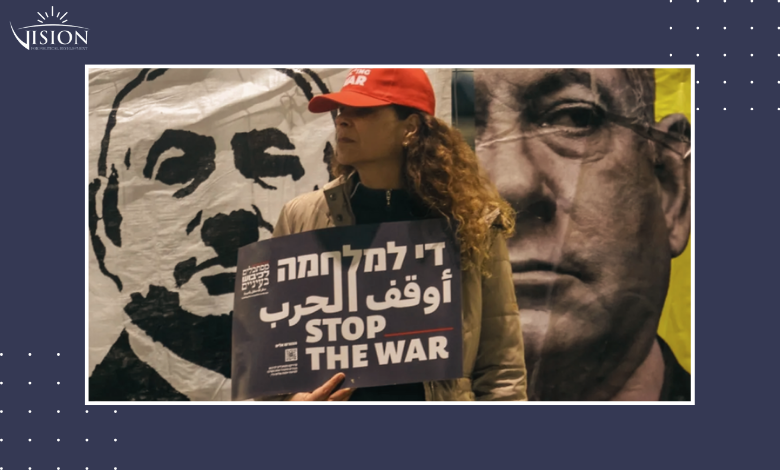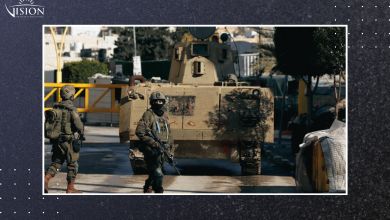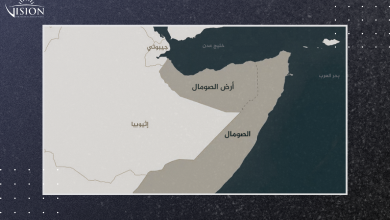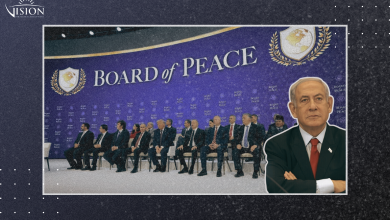Debating Israeli Internal Affairs in Arab Media During War: Scope and the Question of Relevance

Amid the ongoing genocide in Gaza, Arab media has sharply increased its coverage of Israeli affairs—political, military, security, economic, and beyond. On one level, this is commendable as it offers valuable insights into the nature and actions of the occupying entity. But on another level, it marks a troubling narrative shift: from exposing Israel’s genocidal onslaught to dissecting Israeli politics. What is striking is the overwhelming presence of this topic and giving it a large space of attention and discussion, which raises real questions about the priorities of media discussion in times of genocide, and the form and content of the coverage.
Arab TV channels—even those supportive of the Palestinian cause—are increasingly crowded with analysts and “experts” on Israeli affairs, spanning a wide range of backgrounds and levels of insight. The result: much of what the Arab viewer now hears is analyses of Israeli positions, readings of the settler entity’s internal political scene, and dissection of party politics and elite discourse. Add to that the flood of translated Hebrew news and op-eds, circulated widely by news outlets, research centers, and social media platforms. So much so that an engaged Arab viewer today might recognize the names of Israeli politicians, commentators, and writers more readily than those of figures from the broader Arab world.
But what is the logic behind this obsession with the machinations of a genocidal settler entity? Why are Arab airwaves saturated with analyses of Israeli politics while Gaza is being erased in real time? What impact does this have on Arab and Palestinian public opinion—on their levels of awareness, outrage, and the will to resist? Do the positives and benefits of this strategy truly outweigh the risks and challenges it may entail? Is this ‘insight’ or ‘distraction’, and how does it shape the thinking of Arab and Palestinian decision-makers?
Despite the length and brutality of the ongoing confrontation, Arab media coverage has remained largely static and formulaic—both in style and content. Day after day, hours of airtime are dedicated to a ‘theatrical’ of Israeli affairs “specialists,” echoing near-identical narratives and frameworks. Much of the translated Israeli commentary mirrors this same line—anchored overwhelmingly in the perspective of the so-called Israeli left.
The focus? A near-obsessive spotlight on Benjamin Netanyahu, portraying the genocidal campaign as a byproduct of his personal politics and clinging to power. Analysts dissect internal disagreements within the entity—between Netanyahu and elements of its military, security, and political elite—while some go as far as drawing distinctions between the occupation’s institutions and its far-right government, in the hope that highlighting these fractures might deepen internal divisions.
The question of usefulness becomes even more pressing when we realize this media flow is entirely one-sided. Arab and Palestinian analysts—despite their sheer number—are virtually absent from Israeli TV channels, news sites, or discourse. Their commentary is neither aired nor translated into Hebrew. Israeli media rarely references Arab outlets, no matter how widely viewed—except for the occasional exclusive headline or breaking statement from resistance leaders or regional figures.
This imbalance is not coincidental. It stems from internal policies, media culture, and structural choices within the settler entity—realities that, while worth examining, fall outside the scope of this discussion.
What Should the Arab Viewer Really Know About Israel?
Focusing on political shifts, power players, and internal dynamics within the Israeli arena is not without logic. It is undeniably relevant—for the Arab public, for intellectuals, and for decision-makers—especially during a moment of genocide. Understanding the enemy, in line with the maxim “know your enemy,” is crucial. But the nature and volume of the coverage is what should be discussed and reviewed. Flooding Arab media with near-verbatim translations from Hebrew outlets—parroting Israeli analysts and political figures to interpret the occupation’s behaviour—risks distorting the overall picture, andcentering the enemy’s narrative, rather than its most brutal crimes. This may lead to a major imbalance in drawing an objective and balanced picture of the scene surrounding the Gaza genocide.
This uncritical, excessive reliance on Israeli media and voices demands urgent reassessment. Key observations emerging from this media approach are as follows:
1. What is happening in Gaza needs to be defined clearly and unequivocally: a genocide carried out by the Zionist entity—not just a government, not a rogue faction, but the entity as a whole. It operates as a single, integrated settler-colonial system—political, military, and security alike. The fascist government led by Netanyahu is not a deviation; it is the official, authoritative expression of the entity, so long as it holds power, commands a majority in the Knesset, and has full obedience from the army, intelligence services, and media apparatus. Any attempt to fragment or soften this definition is a distortion—and a service to the occupier’s narrative.
2. Israeli aggression is only one piece of a bigger, oft-overlooked picture. Yes, the internal dynamics of the occupying entity matter. But they are only a part of the broader picture—and arguably not the most important one, when it comes to stopping the genocide. What about the role of the Arab and Islamic world? What about international actors, or even the internal Palestinian political landscape? These arenas are just as crucial—if not more— in shaping the outcome of this genocidal campaign, yet they receive a fraction of the coverage.
Switch on the Arab world’s leading satellite channels, and what we see is a constant array of Israeli affairs “specialists,” anchoring prime time with endless analyses. Meanwhile, serious, sustained examination of Arab, Islamic, or international political behaviour is rare—reserved only for exceptional moments. This imbalance in coverage is a blind spot; that reflects media priorities at a time when clarity and focus are matters of life and death.
3. The actions (or inaction) of peoples, political parties, states, and regional organizations across the Arab and Muslim worlds demand far more than fleeting coverage. They require in-depth critical analyses. What are the impediments to effective solidarity? Why has pressure to stop the genocide remained weak, symbolic and/or performative? What internal and external obstacles are stalling mass mobilization or meaningful political response?
These are critical questions—but no major Arab news outlet has seriously engaged with them. Instead of dissecting the structural and political barriers to collective action, media coverage often stops at surface-level reporting or celebratory framing. What seems to be missing is the hard, uncomfortable work: confronting failures, mapping challenges, and exploring practical strategies to turn outrage into pressure. Without that, solidarity risks becoming a spectacle rather than a force.
4. In the face of weakness displayed by Arab and Islamic World, spotlighting and analyzing the behaviour of global powers is essential. Understanding shifting dynamics in Europe, the roots of policy changes, and how public sentiment influences the governments therein, is critical. The same goes for serious, nuanced readings of the positions of Russia, China, India, and other key players.
These are the forces that help shape the trajectory—and potential endgame—of the genocidal assault on Gaza. What can Palestinians and Arabs realistically expect from the international system? This question is just as vital as analyzing the settler entity’s internal politics—yet this remains largely neglected in Arab media coverage. Without this global lens, the picture is incomplete, and the path forward dangerously unclear.
5. More critical than Israeli politics or even international dynamics is the question of: How are Palestinian actors themselves responding to the genocide in Gaza?
Why is there so little sustained, in-depth scrutiny of the Palestinian Authority, the PLO, and the major factions—especially those with influence? Why are media platforms not engaging with their strategies, silences, contradictions, or failures? And what about the Palestinian people themselves—across Gaza, the West Bank, Jerusalem, the ‘48 territories, the refugee camps, and the diaspora? What are the real conditions they face? What is holding back large-scale mobilization, even at the most basic level?
These are the hard questions Arab media largely avoids. Yet without addressing the internal Palestinian landscape—its fractures, pressures, and potential—any understanding of the broader confrontation remains shallow. The core of the resistance is under siege, and the world is watching. But is the Palestinian political system watching too? Or just watching it unfold?
6. The grim reality is that hours upon hours of daily coverage, and endless panels of Israeli affairs analysts—do not affect Israeli public opinion, as none of the Israelis hear it, and therefore it does not affect the course of the ongoing genocide or the decisions related to it.
Meanwhile, for the Arab viewer, this flood of analyses does not spark action—it often does the opposite. By framing the onslaught as Netanyahu’s personal war, many walk away thinking it will all end through internal transformations, once he falls. That illusion deactivates urgency and paralyzes solidarity, as the Arab public already knows what Israel is. It has lived it for generations—as occupation, as violence, as apartheid. So, if this obsessive dissection of the occupier’s politics is not changing Israeli behaviour, is not energizing Arab action, and is not shaping the battlefield in any way—what is it really doing?
7. To frame this genocidal onslaught as Netanyahu’s personal war is a dangerous oversimplification—and a disservice to the truth. What we see unfolding in Gaza is being waged by a deeply entrenched, fascist, settler-colonial entity. The entire system—military, political, security, and public—has lurched hard to the right, deep into the realm of extremism and bloodlust.
Parsing out differences between the political, military, or intelligence echelons may seem nuanced, but it does little for the Arab viewer—and even less for the Palestinian decision-maker. The reality on the ground reveals a horrifying consensus across the occupation’s institutions. The war is not a product of factional disagreement, but of systemic alignment.
Consider the scope of Israeli military and intelligence operations across Gaza, Lebanon, Syria, Iraq, Yemen, and even Iran. Are these complex, high-risk assassinations and airstrikes just part of Netanyahu’s bid to avoid jail? Did the systematic annihilation of Gaza’s civilian infrastructure happen simply to save one man’s political career?
Of course not. These are the actions of a colonial regime that is operating in full, blood-soaked harmony—across ministries, across security bodies, and across political lines, including many parties not in Netanyahu’s coalition.
The proof? On July 18, 2024, the Israeli Knesset voted overwhelmingly—102 out of 120 members—to reject the establishment of a Palestinian state. Only 9 opposed. This is not Netanyahu’s war. This is Israel’s war—unified, unapologetic, and genocidal.
In conclusion, adopting the vision and narrative of the defunct Israeli left on the Palestinian issue and the genocidal war on Gaza, which is clearly visible in the Arab media coverage, is no longer appropriate today; as this framing shifts focus away from urgent issues, and does nothing to advance the Palestinian cause or support broader Arab interests. It does nothing to stop the genocide., and it does not contribute towards ending the aggression against the Palestinian people. Rather, presenting the occupying state as it is, and presenting its reality as it is, is the most important thing, especially in the time of the genocidal onslaught, denying the rights and even the existence of the Palestinian people, the spread of fascist and extremist thought and the control of the right and fascist right over the political scene, and the control of brutality and aggression over the components of the Knesset.
This is an attempt to draw attention to what we believe is a deep-seated, systemic flaw—one that can still be addressed and corrected before it’s too late. The hope is that such a recalibration in media framing may contribute, however modestly, to halting the genocide, confronting efforts to erase the Palestinian people from their land, and defending the core of the Palestinian cause.
Because beyond Gaza, this isn’t just about Palestine. Left unchallenged, the current media narrative helps entrench Israel as an untouchable, hyper-militarized entity—one portrayed as too powerful, too savage, too invincible to challenge and confront. That myth doesn’t just demoralize. It threatens the future of every nation and people in the region, with consequences that reach far beyond.
What’s urgently needed is truth without filters: presenting the occupation as it is—a violent, fascist, settler-colonial entity that denies Palestinian rights, denies Palestinian existence, and is dominated by a political ecosystem built upon extremism, racism, and militarized brutality.





